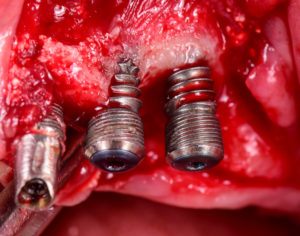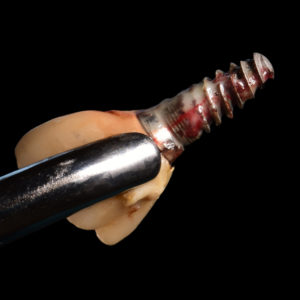September 1, 2018
Dental implants have a success rate of 95%. However, that still means a small portion of the time, patients experience dental implant failure. Some of the signs an implant is beginning to fail include:
- Bleeding around the implant site
- A loose-feeling implant
- Strange odors coming from the pocket
- Pus forming between the implant and gum tissue
- Swollen gums around the implant site.
In most cases, patients develop problems due to peri-implantitis. This condition requires prompt treatment before the condition escalates.
 How Does Peri-Implantitis Develop?
How Does Peri-Implantitis Develop?
In some patients, the gum tissue will not fit nicely around the restoration. As a result, the risk of inflammation increases significantly. Patients who neglect to brush, floss and see their periodontists regularly have enhanced odds of bacteria forming around the pocket. Other risk factors include smoking and having diabetes. In addition to ruining the implant, this condition can also lead to jawbone loss, which is why fast, efficient treatment is necessary.
How Do Periodontists Treatment the Issue?
Individuals who suspect they currently have peri-implantitis should schedule an appointment at the office of periodontist Dr. J. Robert Friedberg immediately. Our office provides the LAPIP® treatment, which utilizes the PerioLase® MVP-7® laser. This device is capable of removing the diseased gum tissue while simultaneously stimulating bone growth.
Prior to the treatment, our periodontist will numb the area in question for your comfort. Due to the speed of the treatment, patients get to enjoy minimal irritation afterward, and the recovery time is minimal. LAPIP® has a high success rate with studies showing that 95 percent of cases where it was used resulted in stabilized bone growth and reintegrated pocket tissue.
Who Should You Turn To?
Treat peri-implantitis in Houston, TX quickly at Dr. Friedberg’s office. You should call us today for an appointment because our trained experts have a lot of experience identifying cases of dental implant failure, allowing you to enjoy your smile once more.
